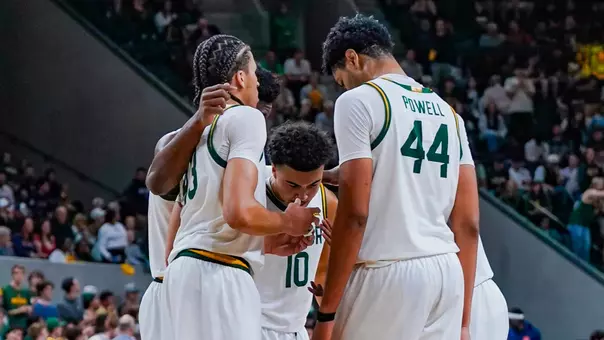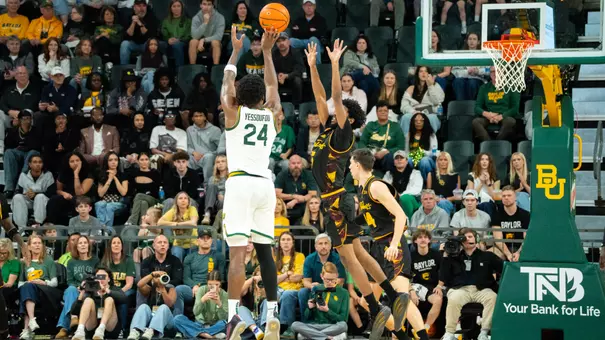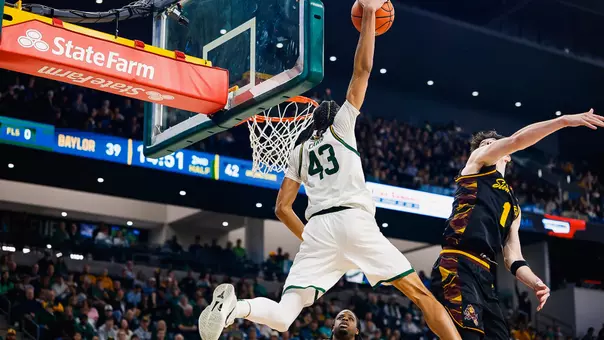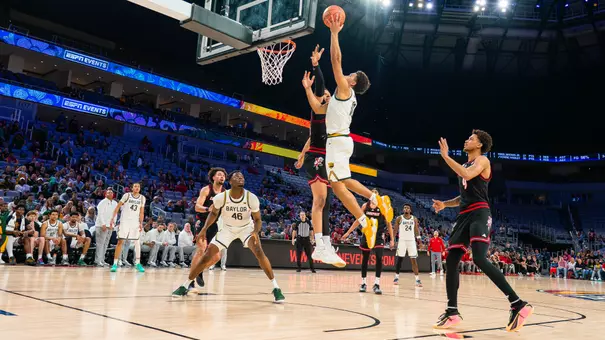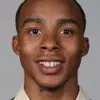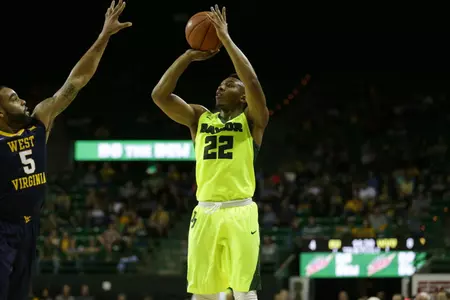
McClure 'Blessed' to Still Play the Game He Loves
3/10/2016 12:00:00 AM | Men's Basketball
Baylor Bear Foundation
King McClure didn't want to believe it, couldn't believe it. Even if it came with extreme risks, like possibly dying, he could never imagine giving up basketball.
Surrounded by his family and the Baylor coaches, the 18-year-old McClure got the devastating news from a doctor last summer, "Your basketball career is over."
"As a coach, the hardest thing you can ever do is talk to a family about their son not being able to ever play the game he loves," said Baylor coach Scott Drew.
Through a screening process that Baylor implemented after it was found that Isaiah Austin had Marfan's Syndrome, tests revealed that the 6-foot-3 freshman shooting guard had hypertrophic cardiomyopathy (HCM), a condition that affects the muscle of the heart.
While McClure has a lesser degree of it, HCM is the same condition that took the lives of former basketball greats Hank Gathers and Reggie Lewis.
`King put his head underneath his shirt and cried for a couple minutes," said Leroy McClure, his father. "I put my arms around him and said, `King, I've helped you in every which way I could. . . . But right now, I can't help you. Right now, you need to call on Jesus.' He looked up at me and said, `Dad, in six months, I'll be ready to play again.'''
Miraculously, he was actually back in four months.
After getting second, third and fourth opinions, King found a doctor at the Mayo Clinic in Rochester, Minn., who determined that only one of HCM's possible seven factors (a slightly enlarged heart wall) was prevalent in his case.
"Given King's flavor of HCM, his chance of experiencing an HCM episode that could be life-threatening is about 1 to 2 percent per year," Dr. Michael Ackerman told Bleacher Report.
Furthermore, the Implantable Cardioverter Defibrillator (ICD) that King had surgically implanted the first week of August has a 95 percent likelihood of countering or aborting the problem "should that 1 percent become a reality," Ackerman said.
"Faith played a huge part in this whole process," King said. "I just trusted in God and knew that He had my back."
Even more importantly, his father said, God had his heart. In the King James translation, Proverbs 21:1 says, "The king's heart is in the hand of the Lord."
"(The original diagnosis) was devastating," Leroy said. "But we knew that this is what the man says, we knew that God would have the final word. . . . Man can tell you one thing, but if God has something different in store for you, you've got to go with it."
Try telling that to a mother, though. Yvette McClure's initial thought was that her son had to give up the game to save his life.
"That's the reason it took so long," King said. "My dad and I were like, `Hey, whatever I have to do to get back on the court, we're going to do.' But my mom was like, `No, that's my son, that's my baby, you're not doing this.' So, it took like an extra month just to get her to finally say, `Yeah, I'm ready for this now.' She was really scared at first."
As hard as he took the original diagnosis, King said the four months between June and October that he had to sit out and then recover from surgery were the "hardest times in my life."
"There were a few times I'd sneak into the gym and try to shoot," he said. "But (trainer David Chandler) got on me bad. DC never yells, but one day he yelled at me, and I was like, `I'm sorry.' I just missed it so much.
"My teammates really helped me take my mind off of it, just hanging with them and not really stressing about everything. Because when I'm alone, I start stressing and start thinking about stuff. When I was them, it took my mind off everything."
By the first of October, two months out of surgery and four months removed from the first diagnosis, McClure was back on the court practicing with the team. But it took some time to knock off the rust. "When I first got back, I wasn't confident at all," he said. "Being away for four months, I felt like I was learning everything and taking everything in."
After hitting three 3-pointers in the season opener and scoring 11 points in two of the first three games, McClure went through stretches when he had little to no impact on the game. He failed to score eight times and took 72 of his 109 field goal attempts from outside the 3-point arc.
But in a 73-71 loss at No. 6 Oklahoma, when he had a career-high 17 points, King showed a different element to his game with three steals and impressive drives to the basket. His confidence was clearly back.
"I've always had (the ability to drive), it was just a matter of confidence," said McClure, who is averaging 4.7 points going into the Big 12 Championship in Kansas City, Mo., where the fifth-seeded and No. 22 Bears (21-10) face 23rd-ranked Texas (20-11) at 11:30 a.m. Thursday. "I wasn't really able to do that when I first got back. I didn't have my stamina and I didn't really have the confidence. Then as time progressed, I realized I could do it. It just got better over time, and so did I."
Since King couldn't do anything back in the summer and got started late, Drew said it's tough to compare his freshman year with any other freshman.
"It's like cramming for a final exam and only taking the class for half a semester, versus everyone else that's had a whole year," he said.
By the time King was 2 years old, he was wearing out his Little Tykes basketball goal that "dinged every time I made a shot." And then at 6, he scored all 22 points in his team's one-point victory, which is why he now wears No. 22.
As a three-time all-state pick at Triple A Academy in Dallas, McClure scored a school-record 2,737 points and averaged 24.2 points, 6.0 rebounds, 3.2 steals and 3.0 assists per game. With scholarship offers flooding in from all over the country, King said he was "really big on Kansas and coach (Bill) Self."
A consensus top-100 national recruit that was ranked the fifth-best prospect in Texas, McClure said he met with the Baylor coaches during his junior year and they told him he had a week to make up his mind, "or we'll probably start pursuing somebody else like Isaiah Bruce (who wound up at Kentucky) and some other people."
"I didn't want that, I've got a good situation there, I want to be there," he said, "so I said, `OK, Coach I'll commit to you.'''
Since Baylor is the only of King's five finalists that uses the early screening, Leroy McClure said it was divine intervention that led his son to Baylor's doorstep.
"We feel that it wasn't King's choice," the dad said. "We believe it was God's choice. . . I cannot tell you how much of a blessing that Baylor University was for us."
Now, it's King that's returning the blessings.
"His confidence level and his ability, what he's doing on the court," said senior point guard Lester Medford, "he's really stepped it up from the beginning of the season till now. He's a great player."
